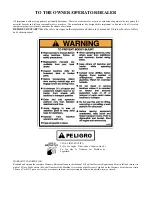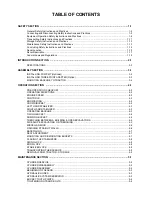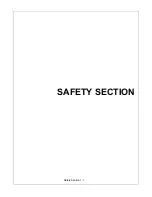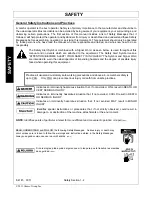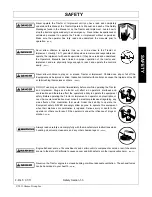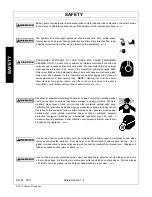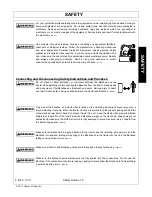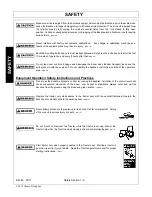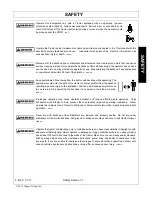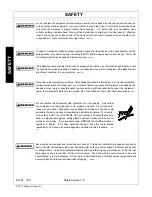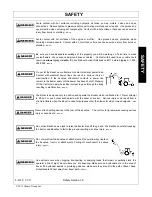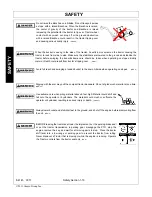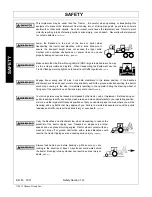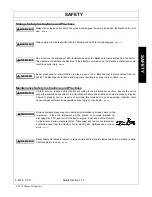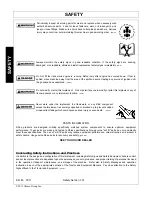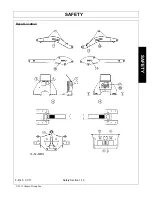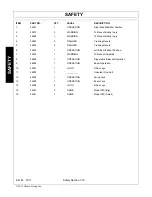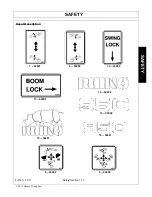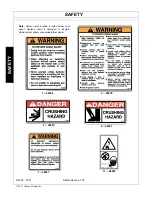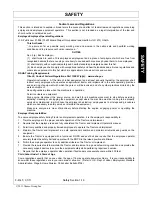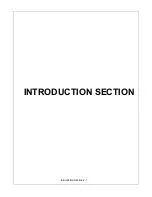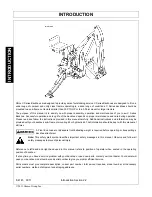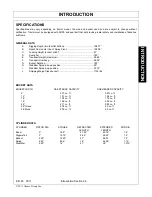
SAFETY
F-4145 01/11
Safety Section 1-11
© 2011 Alamo Group Inc.
SAFETY
Transporting Safety Instructions and Practices
Transport only at speeds where you can maintain control of the equipment.
Serious accidents and injuries can result from operating this equipment at high
speeds. Understand the Tractor and Implement and how it handles before
transporting on streets and highways. Make sure the Tractor steering and brakes are in good
condition and operate properly.
Before transporting the Tractor and Implement, determine the proper transport speeds for you and
the equipment. Make sure you abide by the following rules:
Test the tractor at a slow speed and increase the speed slowly. Apply the Brakes smoothly to
determine the stopping characteristics of the Tractor and Implement. As you increase the speed of
the Tractor the stopping distance increases. Determine the maximum transport speed not to exceed
20 mph (30 kph) for transporting this equipment.
Test the equipment at a slow speed in turns. Increase the speed through the turn only after you
determine that the equipment can be operated at a higher speed. Use extreme care and reduce your
speed when turning sharply to prevent the tractor and implement from turning over. Determine the
maximum turning speed for you and this equipment before operating on roads or uneven ground.
Only transport the Tractor and Implement at the speeds which allow you to properly control the
equipment.
Be aware of the operating conditions. Do not operate the Tractor with weak or faulty brakes or worn
tires. When operating down a hill or on wet or rain slick roads, the braking distance increases: use
extreme care and reduce your speed. When operating in traffic always use the Tractor’s flashing
warning lights and reduce your speed. Be aware of traffic around you and watch out for the other
guy.
(SG-19)
Be particularly careful when transporting the Implement with the Tractor. Turn curves or go up hills
only at a low speed and using a gradual steering angle. Rear mounted implements move the center of
gravity to the rear and remove weight from the front wheels. Make certain, by adding front ballast, that
at least 20% of the tractor’s weight is on the front wheels to prevent rearing up, loss of steering control or Tractor tip-over.
Slow down on rough or uneven surfaces to prevent loss of steering control which could result in property damage or
possible injury. Dropping implement in transport can cause serious damage to the tractor and/or Implement and possibly
cause the operator or others to be injured or killed.
(SBH-38)
Do not drive near the edge of a ditch or excavation. The soil could giveway resulting in loss of control
or rollover.
(SBH-46)
Use extra care when turning or stopping. Allow for increased length and weight of added backhoe.
The backhoe adds five to six feet of length in rear of the tractor and significant weight. Allow extra
distance when stopping or turning. Do not allow backhoe or attachment to contact solid objects.
(SBH-
16)
Summary of Contents for RHINO 95C
Page 5: ...Safety Section 1 1 SAFETY SECTION...
Page 19: ...SAFETY F 4145 01 11 Safety Section 1 15 2011 Alamo Group Inc SAFETY Decal Location...
Page 24: ......
Page 25: ...Introduction Section 2 1 INTRODUCTION SECTION...
Page 28: ...INTRODUCTION F 4145 01 11 Introduction Section 2 4 2011 Alamo Group Inc INTRODUCTION...
Page 29: ...Assembly Section 3 1 ASSEMBLY SECTION...
Page 33: ...Operation Section 4 1 OPERATION SECTION...
Page 42: ......
Page 43: ...Maintenance Section 5 1 MAINTENANCE SECTION...
Page 50: ...MAINTENANCE F 4145 01 11 Maintenance Section 5 8 2011 Alamo Group Inc MAINTENANCE...
Page 53: ......


